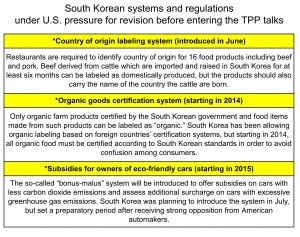Zhezhu Jin
As South Korea considers appealing for membership in the U.S.-led Trans-Pacific Partnership free-trade talks, the United States government is calling on the nation to revise its regulations, including country of origin requirements on processed foods, before entering negotiations.
Speaking at a seminar on South Korea’s participation in the TPP talks held in Washington on Thursday, December 12, Acting Deputy U.S. Trade Representative Wendy Cutler stressed the need for South Korea to address some pending issues in implementing the South Korea-U.S. Free Trade Agreement, or KORUS FTA, before joining the TPP talks.
Cutler said that in addition to meeting the high-level standard of trade liberalization, South Korea would have to take action quickly to resolve issues of concern for the U.S. Congress and stakeholders, including its strict organic goods certification and the planned system of imposing surcharges on cars with high levels of environmental pollutants.
Her remarks came amid growing concern in South Korea that the U.S. is interfering in South Korea’s domestic affairs by linking the implementation of KORUS FTA with the TPP talks.
In June, the South Korean government expanded and strengthened its country of origin labeling system to require restaurants to notify customers of the country of origin of 16 domestically-processed food items, including beef and pork. The move is in addition to the existing rules for domestically-processed products of requiring country of origin labeling for top two ingredients in terms of proportion. The restaurants are also required under the new system to identify the name of the country where the imported cattle or pigs were born, when offering products derived from livestock which were raised domestically for at least six months after being imported and are labeled as domestically produced.
As consumer worries about the safety of U.S. beef remain in South Korea after the spread of bovine spongiform encephalopathy (BSE), the U.S. government has claimed that South Korea’s strengthening of country of origin labeling rules would offset the benefits of tariff cuts under KORUS FTA. U.S. Vice President Joe Biden also said on Friday, December 6, in a speech during his visit to Seoul that eliminating trade barriers is the principle of the free trade agreement, indicating that the U.S. is against systems and regulations that hamper trade, even if they are not clearly specified in the agreement.
Officials of South Korea’s Ministry of Trade, Industry and Energy told The Japan Agricultural News that the U.S. has always been bringing up the issues in the process of implementing KORUS FTA, indicating that the issues are not directly related to the agreement.
 Song Gi-ho, chairman of the foreign affairs and trade committee of Lawyers for a Democratic Society, analyzes that the U.S.-led, neoliberalistic economic partnerships like KORUS FTA and the TPP talks proved to be the way to intervene in domestic affairs of other nations. Song said that the U.S. officials’ remarks would rekindle protest campaigns against the free trade agreement in South Korea.
Song Gi-ho, chairman of the foreign affairs and trade committee of Lawyers for a Democratic Society, analyzes that the U.S.-led, neoliberalistic economic partnerships like KORUS FTA and the TPP talks proved to be the way to intervene in domestic affairs of other nations. Song said that the U.S. officials’ remarks would rekindle protest campaigns against the free trade agreement in South Korea.
(Dec. 27, 2013)

